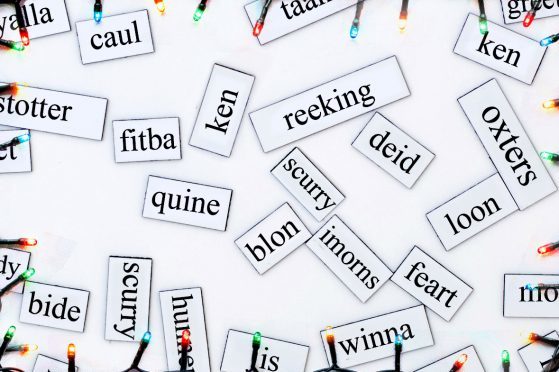Doric and Shetlandic are just two of the dialects at the heart of a national search for the most iconic Scots word.
The Scottish Book Trust has revealed a 30-strong shortlist which it is putting to a vote ahead of Book Week Scotland.
One of the charity’s aims is to preserve native languages across the country and the competition ties in with their Year of Conversation and the International Year of Indigenous Languages.
The public were invited to submit their favourite iconic Scots words and more than 200 words were nominated from dialects such as Doric, Shetlandic, Dundonian and Glaswegian.
Words such as “piece”, which is used commonly in the north-east and whose definition is given as “a piece of bread and butter, jam or the like, a snack, usually of bread, scone or oatcake, a sandwich” made the list.
Among the other most popular words nominated were ‘dreich’, ‘scunnered’ and ‘glaikit’.
A panel of Scots language experts met to whittle down the longlist, with their number including Rhona Alcorn, CEO of the Scots Language Dictionary; Michael Hance, former director of the Scots Language Centre; Bruce Eunson, Scots Language coordinator for Education Scotland and Anna Stewart, New Writers Awardee and Scots writer.
A shortlist of 30 Scots words were eventually decided upon, although the vote has already sparked debate, as some words, including ‘mankie’, were found not to be especially Scots, despite many believing so.
Conversely, some have been surprised to discover ‘outwith’ is rarely used outside Scots-speaking areas.
Marc Lambert, CEO of Scottish Book Trust, said: “This year’s vote for Book Week Scotland celebrates Scots, from the everyday words we use in conversation, to the words we may be encountering for the first time.
“We received many wonderful anecdotes through our submissions, highlighting that Scots remains a vital and important part of cultural heritage, passed down from generation to generation.”
Voting is now open for the competition and the public can pick the word they believe to be most iconic on the Scottish Book Trust’s website.
The most popular word will be announced during Book Week Scotland, which runs from November 18-24.
The Gaelic Books Council are also running their own vote to find the nation’s favourite Gaelic word.
The public have already submitted words at Wigtown Book Festival, the Mòd and through social media.
Nominations can be made at their website and the favourite word will also be announced during Book Week Scotland.
The list
1. Beastie: familiar and affectionate contraction of beast.
2. Besom, also bissom, bizzem, bizzum: a term of contempt applied jocularly to a woman or young girl.
3. Braw, also bra’, braa: of things: fine, splendid, illustrious; also used ironically.
4. Bumfle, also bumfill: an untidy bundle; a pucker, ruffle, in a garment.
5. Burn: a brook or stream, also known as the water used in brewing.
6. Clipe, also clype, klipe, claip: to tell tales about, inform against someone.
7. Collie-buckie, also coalie-back(ie), coalie buck(ie), collie-back(ie), cuddie-back: a piggy-back, a ride on one’s shoulders.
8. Dreich: long-drawn-out, protracted, hence tedious, wearisome.
9. Dwam: a stupor, a trance; a day-dream, reverie.
10. Eeksie-peeksie, also eeksy-peeksy: on an equality, much alike, six and half a dozen.
11. Fankle, also fangle: to tangle, ravel, mix up.
12. Glaikit, also gleckit, gleekit: stupid, foolish; thoughtless, irresponsible, flighty, frivolous.
13. Gloamin: evening twilight, dusk.
14. Guising, also guisin: mummer, masquerader, especially in modern times one of a party of children who go in disguise from door to door at various festivals.
15. Haver, also haiver: to talk in a foolish or trivial manner, speak nonsense, to babble, gossip.
16. Ken: to know, be aware of, apprehend, learn.
17. Neeps: turnip, often served with haggis and tatties.
18. Nyaff, also nyaf: A small, conceited, impudent, chattering fellow.
19. Outwith, also ootwith: Outside, out of, beyond.
20. Piece: a piece of bread and butter, jam, or the like, a snack, usually of bread, scone or oatcake, a sandwich.
21. Scunnered, also scunnert: to make (one) bored, uninterested or antipathetic.
22. Shoogle, also shoggle, schochle: to shake, joggle, to cause to totter or rock, to swing backwards and forwards.
23. Sitooterie: in a restaurant etc., an area where patrons can sit outside; a conservatory.
24. Sleekit: insinuating, sly, cunning, specious, not altogether to be trusted.
25. Smirr, also smir: a fine rain, drizzle, occas. also of sleet or snow.
26. Smoorikin, also smooriken: to exchange kisses, to cuddle, ‘canoodle’
27. Stappit: blocked, choked, stuffed.
28. Totie, also totty, toatie: Small, diminutive, tiny.
29. Wabbit, also wubbit, wappit: exhausted, tired out, played out, feeble, without energy.
30. Wheest, also whisht, weesht: to silence, to cause to be quiet, to hush, quieten.
